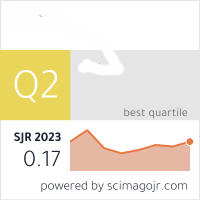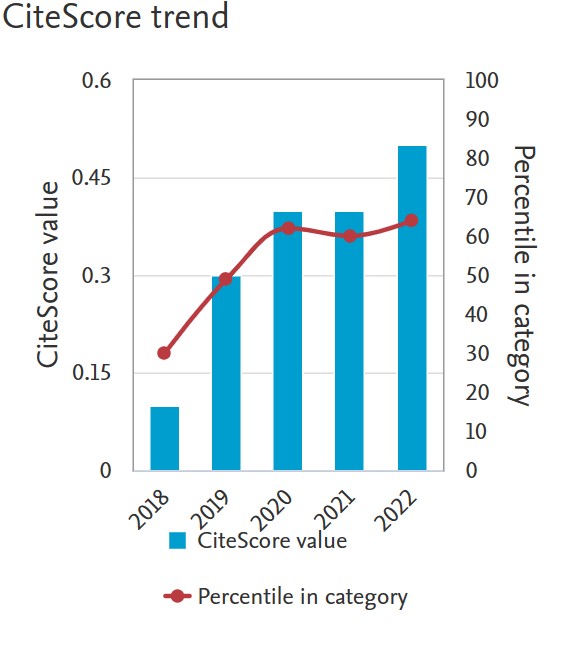Gastrointestinal bleeding as an extrapulmonary effect of COVID-19 infection
Keywords:
Coronavirus, COVID-19, infection, GI bleedingAbstract
Background: Coronavirus disease 2019 (COVID-19) is a worldwide pandemic caused by severe acute
respiratory syndrome coronavirus 2 (SARS-CoV-2), which appear in Wuhan, Hubei Province, China, in
late December 2019. On March 11, 2020, World Health Organization (WHO) considered it a global
pandemic. Although pneumonia is the most common presentation of COVID-19, GIT is regarded as the
most common site for the extrapulmonary manifestation of COVID-19 which includes vomiting, nausea,
diarrhea, abdominal pain, and gastrointestinal (GI) hemorrhage. In covid-19, GI bleeding can result from
multiple factors, isolated or combined This study aimed to evaluate GI bleeding as an extrapulmonary
complication among patients with COVID-19 infection. Materials and methods: This study is completed
in Merjan Medical City, Babylon, Iraq. So the mild cases of COVID-19 that do not need hospital
admission are excluded from this study. It was a retrospective observational study that included a sample
of 1106 inpatients who have been admitted from June 2020 to March 2021. The population of the study
includes every admitted patient who has been diagnosed with COVID-19 by PCR and/or Chest CT scan.
Other investigations used in this study include CBC, CRP, serum creatinine, and blood urea. Results:
Melena was the commonest type of GI bleeding and diabetes was the commonest comorbidity.
Comorbidities and positive CRP have existed in most patients with GI bleeding. Platelet count and PCV
are significantly lower in cases of COVID-19 with GI bleeding. There was a significant association between
plasma, Favipiravir, Remdesivir, Methylprednisolone, and unfractionated heparin and GIT bleeding.
Unfortunately, RCU admission and mortality are the increase in all types of GI bleeding. Conclusion:
Melena was the commonest type of GI bleeding, although all types of GI bleeding were seen in COVID-
19 infection. The major risk factors for GI bleeding were: older age, lower SOP2, higher CT involvement,
associated co-morbidities, and lower platelets count. The use of certain treatments like convalescent
plasma, Remdesivir, and pulse methylprednisolone was associated with an increased risk of bleeding in a
patient with COVID-19 infection.
Downloads
References
Weledji EP. Acute gastrointestinal bleeding: a review.
O2O;3(3):e18
van Leerdam ME, Vreeburg EM, Rauws EA, Geraedts AA,
Tijssen JG, Reitsma JB, et al. Acute upper Gl bleeding: did
anything change? Time trend analysis of incidence and
outcome of acute upper Gl bleeding between 1993/1994
and 2000. The American journal of gastroenterology.
;98(7):1494-9
Al-Agam A OA, Alzughaibi M, Makki H, Alhaideri AF. The
Association of Depressive Symptoms With Plasma CReactive Protein in Patients With Major Depressive
Disorder Under Treatment. Iranian Rehabilitation
Journal. 2021;19(4):425-32
Hayder AA. Al-Hindy MJM, Hayder O. Hashim BCG Vaccine
in Preventing COVID-19 Epidemic Had to be Reviewed:
Correlation does not imply causation. Australian Journal
of Basic and Applied Sciences. 2020;14(11):58-63
Amer Fadhil Alhaideri WAA, Azher Nema Mohammed AlAgam, Mahir Abdulkadhum Alzughaibi, Hayder AbdulAmir M. Al-Hindy, Mazin J. Mousa Hypovitaminosis D is
A Biological Vulnerability for Depressive Symptoms in
Major Depression at the era of COVID-19 Outbreak.
Clinical Schizophrenia & Related Psychoses 2022 5
Amal Talib Al Saady, Abdulameer Abdulrasol, Zainab, Fadhil
Obaid, Ali Abdul-Amir Makki Alhindy, Hayder, S. AlMumin, Amir. Prevalence of adverse effects from
COVID-19 vaccine among Iraqi adults: A retrospective
cross-sectional study. 2O22;2O22(3)-The International
and Scientific Conference of Alnahrain College of
Medicine and Colleges of Medicine in Iraq confronting
COVID-19 Pandemic (ISMC-2022))
Aleem A, Akbar Samad AB, Slenker AK. Emerging Variants
of SARS-CoV-2 And Novel Therapeutics Against
Coronavirus (COVID-19). StatPearls. Treasure Island
(FL): StatPearls Publishing. Copyright © 2022,
StatPearls Publishing LLC.; 2022
Cascella M, Rajnik M, Aleem A, Dulebohn SC, Di Napoli R. Features,
Evaluation, and Treatment of Coronavirus (COVID-19).
StatPearls. Treasure Island (FL): StatPearls Publishing.
Copyright © 2022, StatPearls Publishing LLC.; 2022
Karim Abdul-Husseein H, Akram Al- Akkam, Karam, Karim
Abdul-Husseein, Mustafa, Abdul-Amir Makki Al-Hindy,
Hayder. The Liver Function Abnormalities in COVID-19
Patients and Their Association with Age and Sex: A
Cross-Sectional Study %J Archives of Razi Institute.
Archives of Razi Institute. 2022;(77)
Carvalho A Alqusairi R, Adams A, Paul M, Kothari N, Peters
S, et al. SARS-CoV-2 Gastrointestinal Infection Causing
Hemorrhagic Colitis: Implications for Detection and
Transmission of COVID-19 Disease. The American journal
of gastroenterology. 2020;115(6):942-6
Zhao X, Tao M, Chen C, Zhang Y, Fu Y. Clinical Features and
Factors Associated with Occult Gastrointestinal
Bleeding in COVID-19 Patients. Infection and drug
resistance. 2021;14:4217-26
Tian Y, Rong L, Nian W, He Y. Review article:
gastrointestinal features in COVID-19 and the
possibility of fecal transmission. Alimentary
pharmacology & therapeutics. 2020;51(9):843-51
Qayed E, Deshpande AR, Elmunzer BJ. Low Incidence of Severe
Gastrointestinal Complications in COVID-19 Patients
Admitted to the Intensive Care Unit: A Large, Multicenter
Study. Gastroenterology. 2021;160(4):1403-5
Marasco G, Maida M, Morreale G, Licata M, Renzulli M, Cremon C,
et al. Gastrointestinal Bleeding in COVID-19 Patients: A
Systematic Review with Meta-Analysis. Canadian journal of
gastroenterology & hepatology. 2021;2021:2534975
Ashktorab H, Russo T, Oskrochi G, Latella G, Massironi S,
Luca M, et al. Clinical and Endoscopic Outcomes in
COVID-19 Patients With Gastrointestinal Bleeding.
Gastro Hep Advances. 2O22;1 99 487 4
Fadheel QJ, Naser RT, Al-Hindy HA-AJHN. Evaluation of
Practice of Prescribing and Monitoring Anticoagulants
Among Hospitalized Iraqi Patients. 2O22;22(1):71-6
Martin TA, Wan DW, Hajifathalian K, Tewani S, Shah SL,
Mehta A, et al. Gastrointestinal bleeding in patients with
coronavirus disease 2019: a matched case-control study.
Yang F, Shi S, Zhu J, Shi J, Dai K, Chen X. Analysis of 92
deceased patients with COVID-19. 2O2O;92(11):2511-5
Bardou M, Quenot JP, Barkun A. Stress-related mucosal
disease in the critically ill patient. Nature reviews
Gastroenterology & hepatology. 2O15;12(2):98-1O7Dolovich LR, Ginsberg JS, Douketis JD, Holbrook AM, Cheah
G. A meta-analysis comparing low-molecular-weight
heparins with unfractionated heparin in the treatment
of venous thromboembolism: examining some
unanswered questions regarding the location of
treatment, product type, and dosing frequency. Archives
of internal medicine. 2000;160(2):181-8
Xu J, Chu M, Zhong F, Tan X, Tang G, Mai J, et al. Digestive
symptoms of COVID-19 and expression of ACE2 in
digestive tract organs. Cell death discovery. 2020;6:76
Negro A, Villa G, Rolandi S, Lucchini A, Bambi S.
Gastrointestinal Bleeding in COVID-19 Patients: A Rapid
Review. Gastroenterology nursing: the official journal of
the Society of Gastroenterology Nurses and Associates.
;45(4):267-75
Silvagno F, Vernone A, Pescarmona GP. The Role of
Glutathione in Protecting against the Severe
Inflammatory Response Triggered by COVID-19.
Antioxidants (Basel, Switzerland). 2O2O;9 7
Golabi S, Ghasemi S, Adelipour M, Bagheri R, Suzuki K, Wong
A, et al. Oxidative Stress and Inflammatory Status in
COVID-19 Outpatients: A Health Center-Based
Analytical Cross-Sectional Study. Antioxidants (Basel,
Switzerland). 2O22;11 4
Sulakshana S, Nayak SS, Perumal S, Das BP. HeparinInduced Thrombocytopenia in COVID-19: A Systematic
Review. Anesthesia, essays, and research. 2021;15(4):341-
Maharaj S, Chang S. Anti-PF4/heparin antibodies are
increased in hospitalized patients with bacterial sepsis.
Thrombosis research. 2018;171:111-3
Trindade AJ, Izard S, Coppa K, Hirsch JS, Lee C, Satapathy
SK. Gastrointestinal bleeding in hospitalized COVID-19
patients: a propensity score matched cohort study.
Journal of internal medicine. 2021;289(6):887-94
Downloads
Published
Issue
Section
License
You are free to:
- Share — copy and redistribute the material in any medium or format for any purpose, even commercially.
- Adapt — remix, transform, and build upon the material for any purpose, even commercially.
- The licensor cannot revoke these freedoms as long as you follow the license terms.
Under the following terms:
- Attribution — You must give appropriate credit , provide a link to the license, and indicate if changes were made . You may do so in any reasonable manner, but not in any way that suggests the licensor endorses you or your use.
- No additional restrictions — You may not apply legal terms or technological measures that legally restrict others from doing anything the license permits.
Notices:
You do not have to comply with the license for elements of the material in the public domain or where your use is permitted by an applicable exception or limitation .
No warranties are given. The license may not give you all of the permissions necessary for your intended use. For example, other rights such as publicity, privacy, or moral rights may limit how you use the material.











